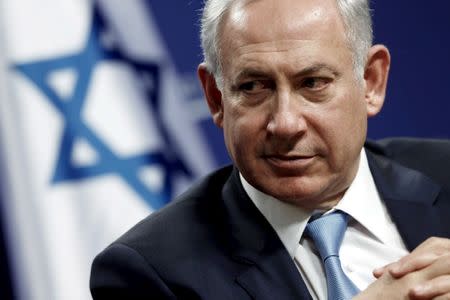U.S. intended to allow passage of U.N. draft critical of Israel: officials
By Michelle Nichols and Lesley Wroughton UNITED NATIONS/WASHINGTON (Reuters) - The United States intended to allow the U.N. Security Council to approve a resolution demanding an end to Israeli settlement building, two Western officials said on Thursday, a major reversal of U.S. practice of protecting Israel from such criticism. Egypt, which had proposed the draft resolution, abruptly put off a vote that had been scheduled for Thursday afternoon and diplomats said Cairo had acted under pressure from Israel and to avoid alienating U.S. President-elect Donald Trump. The two Western officials said that U.S. President Barack Obama had intended to abstain from the vote, a relatively rare step by the United States to register criticism of the building on occupied land that the Palestinians want for a state. U.S. officials have voiced growing fears that a "two-state" solution is imperiled by Israeli settlement building and so have been more willing to voice open criticism of it, including, the two officials said, via Thursday's planned vote. In a sign that they feared Obama might withdraw the United States' long-standing diplomatic protection for Israel, Trump and Israeli Prime Minister Benjamin Netanyahu urged the White House to veto the draft resolution. President Abdel Fattah al-Sisi of Egypt, which in 1979 became the first Arab nation to make peace with Israel, called Trump on Thursday, a Trump transition official said, saying they spoke broadly about laying the ground for Middle East peace. Sisi's office said the two leaders spoke. "The presidents agreed on the importance of affording the new U.S. administration the full chance to deal with all dimensions of the Palestinian case with a view of achieving a full and final settlement," said presidency spokesman Alaa Yousef. The resolution would demand Israel "immediately and completely cease all settlement activities in the occupied Palestinian territory, including East Jerusalem" and it said the establishment of settlements by Israel has "no legal validity and constitutes a flagrant violation under international law". Egypt is currently a Security Council member and worked with the Palestinians to draft the text. CONSTRUCTIVE RELATIONS WITH TRUMP? Officials in Netanyahu's office spoke to Egyptian officials on Thursday about postponing the vote, an Israeli diplomat said. It was not clear what pressure Israel may have put on Egypt but there are several ways it could do so, including curtailing Israeli security cooperation in Egypt's fight against Islamist militants in the Sinai desert. Netanyahu took to Twitter in the dead of night in Israel to make the appeal for a veto, in a sign of concern that Obama might take a parting shot at a policy he has long opposed and at a right-wing Israeli leader with whom he has had strained ties. Hours later, Trump backed fellow conservative Netanyahu on one of the most contentious issues in the Israeli-Palestinian conflict and the pursuit, effectively stalled since 2014, of a two-state solution. The White House declined comment and the State Department declined to immediately comment on reports of the planned abstention. OBAMA CRITICAL OF SETTLEMENTS Obama's administration has been highly critical of settlement construction in the occupied West Bank and East Jerusalem. U.S. officials said this month, however, the president was not expected to make major moves on Israeli-Palestinian peace before leaving office on Jan. 20. Israel's far-right and settler leaders have been buoyed by the election of Trump, who has already signaled a possible change in U.S. policy by tapping a fundraiser for a major Israeli settlement as Washington's ambassador to Israel. Netanyahu, for whom settlers are a key constituency, has said his government has been their greatest ally since the capture of the West Bank and East Jerusalem in a 1967 war. Israel considers all of Jerusalem its capital, a claim that is not recognized internationally. The United States says continued Israeli settlement building lacks legitimacy, but has stopped short of adopting the position of many countries that it is illegal under international law. Some 570,000 Israelis live in the West Bank and East Jerusalem. A resolution needs nine votes in favor and no vetoes by the United States, France, Russia, Britain or China to be adopted. The United States has vetoed dozens of Security Council resolutions on Israel and it is rare for it to abstain. The last time the Security Council adopted a resolution on Israel and the Palestinians was in January 2009, when Washington abstained on a resolution calling for ceasefire and withdrawal of Israeli forces from Gaza. In 1979 the United States abstained on a resolution focused on settlements, when the council said Israeli settlements “have no legal validity and constitute a serious obstruction to achieving a comprehensive, just and lasting peace in the Middle East.” Britain also abstained. (Additional reporting by Yara Bayoumy, Susan Heavey, Arshad Mohammed, Matt Spetalnick, Emily Stephenson and Lesley Wroughton in Washington, John Irish travelling with the French foreign minister, Jeffrey Heller and Ori Lewis in Jerusalem and Amina Ismail and Ahmed Aboulenein in Cairo; Writing by Arshad Mohammed; Editing by Yara Bayoumy and James Dalgleish)





